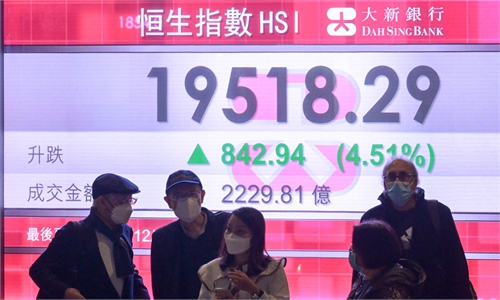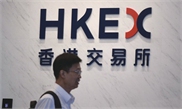Capital markets of mainland, HK welcome expansion of eligible stocks under Stock Connect program
Important milestone in achieving high-level opening-up of capital market

A view of Hong Kong Photo: VCG
The capital markets of the Chinese mainland and the Hong Kong Special Administrative Region welcomed the expansion of eligible shares under the Stock Connect program starting from Monday, a milestone in the high-level institutional opening-up of China's capital market.
The number of stocks eligible for northbound trading will increase by 1,034 to 2,528, while the number eligible for southbound trading will increase to 560.
The expansion is an important initiative for the capital market to actively serve to build a new development pattern and promote a high level of two-way opening, analysts said.
It's significant for facilitating foreign investors to invest in the A-share market and promoting the synergistic development of the capital markets in both places.
According to a statement on the website of Hong Kong Exchanges and Clearing (HKEX), the expansion enables eligible shares of international companies that are primary-listed in Hong Kong to be included in southbound trading.
A total of 12 stocks including four from foreign listed companies in Hong Kong will be brought into the Hong Kong Stock Connect, raising the total number of eligible stocks to 560.
As part of the expansion, eligible constituent stocks of the Shanghai Stock Exchange A Share Index and the Shenzhen Stock Exchange Composite Index that meet certain requirements will be included in northbound trading.
According to the Securities Times, the number of shares under the Shanghai Stock Connect has risen by 598 to 1,192, covering 90.94 percent of the market's capitalization. Under the Shenzhen Stock Connect, the total number is now 1,336, with market capitalization coverage of 86 percent.
"The expansion of both the Southbound and Northbound Stock Connect to include more companies is great news for the market and for investors. This is the next significant milestone development in the continued evolution of this unique and successful mutual market access program," HKEX CEO Nicolas Aguzin said on the official website.
The expanded program is expected to increase trading volume, facilitate the participation of domestic and overseas investors, and attract long-term foreign capital, Yang Delong, chief economist at Shenzhen-based First Seafront Fund Management Co, told the Global Times on Monday.
It also further broadens cross-border investment and financing channels, and gives domestic and foreign investors more ways to allocate their assets, said Dong Shaopeng, a senior research fellow at the Chongyang Institute for Financial Studies at Renmin University of China.
Since the launch of the Stock Connect program in 2014, measures and regulations have been rolled out to optimize the program.
For instance, the program ended the total quota and two-way expansion of the daily quota, and it included shares of biotechnology companies that have not yet made profits, as well as stocks listed on the sci-tech innovation board and exchange-traded funds.
According to Wind data, from 2019 to date, turnover of northbound funds in A-shares was stable at 10-11 percent, while the turnover ratio of southbound funds in Hong Kong stocks had increased to 32.74 percent as of March 10.
The Stock Connect has become one of the most important channels for foreign investors to participate in the A-share market. As of March 10, the net buying of A-shares by northbound funds totaled 1.87 trillion yuan ($271.1 billion), including 990.2 billion yuan from the Shanghai-Hong Kong Stock Connect and 884.2 billion yuan from the Shenzhen-Hong Kong Stock Connect.
"This is a year of exciting enhancements for Connect as we continue to work with our stakeholders to deliver a host of other important initiatives that will further enhance the attractiveness of both Hong Kong's and the Chinese mainland's capital markets. We look forward to updating the market in the coming months, connecting China and the world," Aguzin added.
China adheres to a high-level opening-up of its capital market, with industry and product opening initiatives gradually coming into effect, which has attracted foreign medium- and long-term capital to the market to share the dividends of China's economic growth.
China has facilitated the business development of foreign institutions and expanded financing channels for overseas listings, boosting the international operations of A-share listed companies. The country has also enriched internationalized products like Panda bonds issued by foreign high-quality enterprises.
The increasing two-way opening-up of China's capital markets will have positive significance in enhancing the resilience of China's financial development and making the sources of funds more diversified, Yang said.


